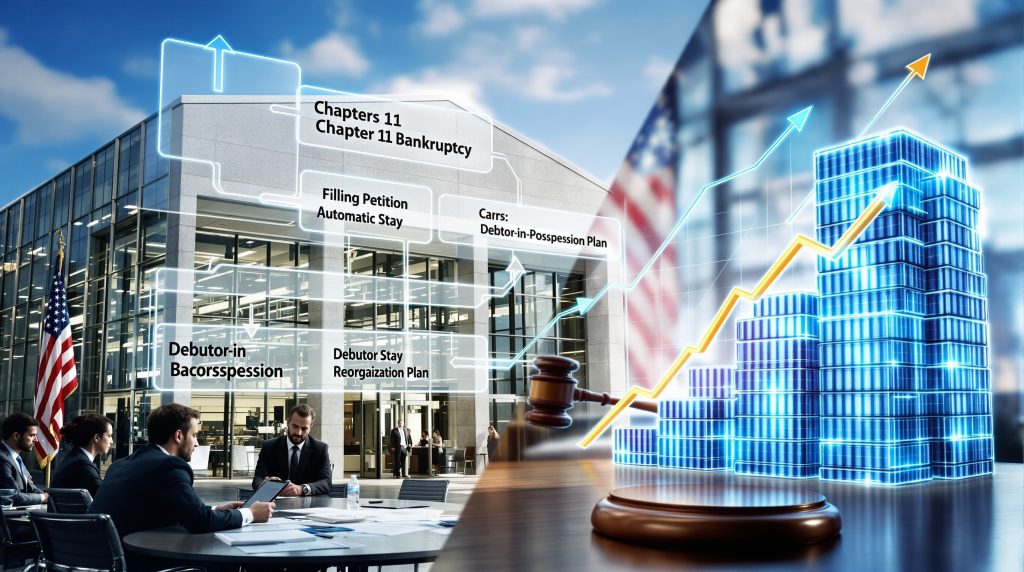What is Chapter 11 Bankruptcy? Understanding the Process and Implications
Chapter 11 bankruptcy provides businesses facing financial difficulties with a structured pathway to reorganize debts while continuing operations. Unlike liquidation options, this form of bankruptcy allows companies to restructure obligations and emerge as viable enterprises. According to recent data from the Administrative Office of the U.S. Courts, business bankruptcy filings increased by 16% in fiscal year 2023, totaling 13,481 cases nationwide.
How Chapter 11 Bankruptcy Works
The Filing Process
The journey through Chapter 11 begins when a company voluntarily files a petition with the bankruptcy court. This critical first step initiates several important protections:
- Automatic stay protection immediately halts all collection attempts, lawsuits, and foreclosures against the company
- Debtor-in-possession status allows existing management to retain operational control in most cases
- Court supervision begins with a bankruptcy judge overseeing the case while the U.S. Trustee monitors administrative aspects
- Initial filing documents must include schedules of assets, liabilities, and financial affairs
The automatic stay provision under 11 U.S.C. § 362 serves as a powerful shield, giving the business breathing room to develop a reorganization strategy without creditor pressure.
Key Components of Chapter 11 Reorganization
Successfully navigating Chapter 11 requires addressing several fundamental components:
- Debt restructuring involves negotiating modified payment terms, interest rates, and sometimes principal reductions
- Asset evaluation requires comprehensive assessment of all company holdings and their current market values
- Operational adjustments typically include cost-cutting measures, efficiency improvements, and sometimes facility closures
- Creditor committees form to represent different classes of creditors during negotiations
- Reorganization plan must be developed, submitted to creditors for voting, and approved by the court
Important note: The average Chapter 11 case typically takes between 12 and 24 months to complete, though complex cases involving multiple facilities or international operations can extend significantly longer.
The restructuring plan must balance the interests of various stakeholders while creating a viable path forward for the business. This delicate balance requires substantial financial and legal expertise.
What is Debtor-in-Possession (DIP) Financing?
Definition and Purpose
Debtor-in-possession financing represents a specialized form of credit extended to companies already in Chapter 11 proceedings. This critical funding mechanism enables businesses to maintain operations throughout the restructuring process.
Key Characteristics of DIP Financing
DIP financing stands apart from conventional business loans in several important ways:
- Super-priority status places these loans ahead of most pre-existing debts in the payment hierarchy
- Court approval requirement ensures the terms are fair and necessary for reorganization
- Strict covenants typically include detailed financial reporting and performance metrics
- Higher interest rates reflect the elevated risk profile of lending to a bankrupt entity
- Specified use restrictions often direct how funds can be deployed during reorganization
These unique characteristics make DIP loans simultaneously attractive to specialized lenders and essential for companies navigating bankruptcy.
Benefits to Stakeholders
The availability of DIP financing creates advantages across the stakeholder spectrum:
- For the company: Provides essential liquidity to maintain operations, meet payroll, and implement restructuring initiatives
- For employees: Helps preserve jobs and maintain benefit programs that might otherwise be jeopardized
- For suppliers: Enables continued business relationships and potentially expedites payment of outstanding invoices
- For lenders: Offers attractive returns with court-backed security provisions and priority repayment status
- For customers: Ensures continued availability of products or services without disruption
Financial experts note that securing adequate DIP financing often represents the difference between successful reorganization and liquidation for struggling companies.
How Does Aleon Metals' Chapter 11 Filing Impact the Critical Minerals Sector?
Aleon Metals' Strategic Bankruptcy Filing
Aleon Metals' Chapter 11 bankruptcy filing on August 18, 2025, represents a calculated move to strengthen its position in the critical minerals energy transition sector rather than a distress-driven last resort.
Company Background and Current Situation
Aleon Metals has established itself as a significant player in the critical minerals landscape through:
- Business focus on sustainable recycling and production of critical minerals essential to American industries
- Filing location in the Southern District of Texas' U.S. Bankruptcy Court, known for expertise in complex restructurings
- Financing secured totaling $188 million in debtor-in-possession funding to maintain operations
- Operational status continuing normal business activities throughout the restructuring process
- Facility portfolio including GMR (Gladieux Metals Recycling) and ARM (Aleon Renewable Metals) operations
This strategic bankruptcy filing aims to strengthen rather than simply salvage the company's position in the growing critical minerals sector.
Strategic Objectives of the Restructuring
Aleon's restructuring plan outlines several ambitious objectives:
- Operational continuity maintaining uninterrupted production and customer supply relationships
- Facility investment enhancing Freeport, Texas operations with capital improvements
- Employee protection preserving jobs with full wages and benefits throughout the process
- Supply chain stability ensuring continued availability of critical minerals to downstream industries
- Innovation acceleration developing advanced recycling technologies and processes
CEO Tarun Bhatt emphasized the strategic nature of the filing: "We have worked diligently to streamline our operations and position Aleon for continued growth. Now more than ever, offering a sustainable, domestic alternative to foreign-sourced critical minerals is essential. This process enables us to invest further in GMR and ARM, accelerate innovation and secure Aleon's role as a long-term leader in US critical mineral supply."
The Significance of Aleon's Freeport Operations
Importance to U.S. Critical Minerals Supply
The Freeport, Texas facility plays a crucial role in domestic critical minerals production:
- Domestic production reduces dependence on foreign-sourced critical minerals which often face supply chain disruptions
- National security implications support materials needed for defense, aerospace, and technology sectors
- Supply chain resilience strengthens domestic capacity for essential industrial inputs
- Environmental sustainability promotes recycling and responsible production methods with lower carbon footprints
- Economic contribution provides specialized manufacturing jobs and supports local economies
Chief Restructuring Officer Roy Gallagher highlighted this significance: "This is a pivotal step in Aleon's journey. With fresh capital, strong stakeholder support and a competitive process under way, Aleon is positioned to enhance its Freeport operations and continue providing critical minerals that are essential to America's future."
Planned Facility Enhancements
The $188 million DIP financing package enables Aleon to pursue several facility improvements:
- Production expansion increasing output capacity to meet growing demand for domestically-sourced materials
- Technological upgrades implementing advanced processing capabilities to enhance recovery rates
- Efficiency improvements reducing operational costs and environmental impact through process optimization
- Innovation acceleration developing new recycling and production methodologies for previously challenging materials
- Infrastructure modernization upgrading aging equipment and systems to improve reliability
These investments aim to position Aleon's Freeport operations as a cornerstone of domestic critical minerals production for decades to come.
What is the "Stalking Horse" Bidding Process in Bankruptcy?
Understanding Section 363 Sales
Section 363 of the Bankruptcy Code provides a powerful mechanism for companies to sell assets during reorganization proceedings.
Definition and Purpose
A Section 363 sale refers to a court-supervised transaction under the Bankruptcy Code that allows for the sale of assets "free and clear" of most liabilities and encumbrances. This clean title transfer makes these transactions particularly attractive to potential buyers.
Key features of Section 363 sales include:
- Liability protection shields buyers from most pre-bankruptcy claims against the assets
- Expedited timeline typically moves faster than traditional acquisitions or plan-based sales
- Court oversight provides greater certainty and finality once approved
- Enhanced value often maximizes returns through competitive bidding procedures
- Flexibility allows for sale of specific assets, divisions, or entire businesses
The "free and clear" provision under 11 U.S.C. § 363(f) represents one of the most powerful tools in bankruptcy, enabling assets to transfer without the drag of historical liabilities.
Key Advantages
Section 363 sales offer several distinct benefits over traditional bankruptcy reorganizations:
- Expedited timeline typically completes in 60-90 days versus potentially years for a full reorganization
- Liability protection purchasers acquire assets without most pre-existing obligations, litigation claims, or encumbrances
- Court approval judicial oversight provides transaction certainty and shields against later challenges
- Competitive pricing auction process may maximize asset value through multiple bidder participation
- Reduced diligence burden court process can streamline certain aspects of transaction review
These advantages make Section 363 sales an increasingly popular option for distressed companies seeking efficient paths forward.
The Stalking Horse Bidder Role
Function in Bankruptcy Sales
The stalking horse bidder plays a pivotal role in establishing the foundation for a successful bankruptcy auction:
- Initial bid establishment sets the minimum acceptable offer for company assets, preventing lowball offers
- Due diligence investment conducts comprehensive analysis to determine appropriate valuation
- Bid protections often receives break-up fees if outbid to compensate for effort and expenses
- Market validation demonstrates legitimate interest in acquiring the business to other potential bidders
- Procedural framework helps establish auction rules and qualification requirements
These functions help create structure and confidence in what might otherwise be a chaotic asset disposition process.
Aleon's Stalking Horse Arrangement
Aleon Metals has established a structured stalking horse process with several key components:
- Bidder identity consortium of DIP lenders serving as initial bidders with established knowledge of operations
- Marketing process investment banker Jefferies conducting competitive auction to identify highest/best offers
- Objective securing optimal outcomes for employees, customers, community, and stakeholders
- Bid protections likely include break-up fees and expense reimbursement if another bidder prevails
- Timeline management established schedule for due diligence, bid submissions, and auction completion
Roy Gallagher noted the competitive nature of this process: "With fresh capital, strong stakeholder support and a competitive process under way, Aleon is positioned to enhance its Freeport operations."
How Will This Restructuring Impact Aleon's Business Operations?
Operational Continuity During Bankruptcy
Chapter 11 provides a framework for businesses to continue operating while restructuring debt obligations.
Day-to-Day Business Activities
Aleon Metals has emphasized operational continuity throughout the restructuring process:
- Uninterrupted production maintaining normal manufacturing and recycling operations
- Customer relationships continuing to fulfill supply agreements and contracts without disruption
- Employee stability preserving workforce with full compensation and benefits
- Vendor management addressing supplier concerns through court-approved processes
- Capital investments proceeding with necessary maintenance and upgrades
The $188 million DIP financing package provides essential liquidity to maintain these operations throughout the bankruptcy proceedings.
First-Day Motions and Court Approvals
Aleon has submitted several standard "first-day motions" seeking court approval for:
- Wage authorization requesting permission to continue employee compensation and benefits
- Vendor payments seeking authority to pay critical suppliers to maintain supply chain integrity
- Utility service maintenance ensuring continued essential services for facility operations
- Cash management establishing procedures for financial operations during bankruptcy
- Customer programs maintaining warranties, returns, and other customer-facing initiatives
These motions typically receive expedited consideration from bankruptcy courts to minimize operational disruption.
Long-Term Strategic Vision
Post-Restructuring Business Objectives
Aleon's restructuring plan outlines several ambitious long-term objectives:
- Streamlined operations implementing more efficient business processes and organizational structures
- Enhanced production capacity expanding output of critical minerals to meet growing domestic demand
- Innovation focus accelerating development of sustainable recycling technologies and processes
- Market leadership strengthening position in domestic critical minerals supply chain
- Financial stability establishing sustainable capital structure with manageable debt obligations
CEO Tarun Bhatt articulated this vision: "This process enables us to invest further in GMR and ARM, accelerate innovation and secure Aleon's role as a long-term leader in US critical mineral supply."
Environmental and Community Commitments
Aleon has emphasized maintaining its environmental and community responsibilities throughout restructuring:
- Sustainability initiatives continuing focus on environmentally responsible recycling practices
- Local economic impact preserving and potentially expanding employment opportunities
- Community engagement maintaining positive role in Freeport area development
- Domestic supply chain contributing to U.S. critical mineral independence and security
- Educational partnerships supporting workforce development in sustainable manufacturing
Bhatt specifically emphasized these commitments: "while continuing to support local jobs, play a positive role in the community and advance environmental sustainability for future generations."
What Expert Support is Guiding Aleon Through Restructuring?
Professional Advisory Team
Successful navigation of Chapter 11 requires specialized expertise across multiple disciplines.
Legal Representation
Aleon has assembled a comprehensive legal team to guide the restructuring process:
- Primary counsel Morrison & Foerster providing bankruptcy expertise and overall case management
- Regional specialists Norton Rose Fulbright serving as Texas restructuring counsel with local expertise
- Court navigation guiding company through complex legal requirements and procedural hurdles
- Stakeholder negotiations facilitating discussions with creditors and interested parties
- Regulatory compliance ensuring adherence to industry-specific regulations during restructuring
These legal advisors bring specialized expertise in both bankruptcy law and the critical minerals sector.
Financial and Restructuring Advisors
Complementing the legal team, Aleon has engaged financial experts to manage the restructuring:
- Investment banking Jefferies managing asset marketing and sale process to maximize value
- Restructuring consultation Ankura Consulting Group providing specialized guidance on reorganization
- Chief Restructuring Officer Roy Gallagher overseeing reorganization process and stakeholder communications
- Strategic planning developing viable business model for post-bankruptcy operations
- Financial modeling creating projections and scenarios to support reorganization plan development
This integrated advisory approach helps ensure all aspects of the complex restructuring process receive appropriate expertise and attention.
What Are the Broader Implications for the Critical Minerals Industry?
Market Impact and Industry Trends
Aleon's restructuring occurs against a backdrop of increasing focus on domestic critical minerals production.
Supply Chain Considerations
The restructuring highlights several important supply chain dynamics:
- Domestic production stability maintaining U.S. critical mineral availability despite global supply challenges
- Customer reassurance providing certainty to downstream manufacturers relying on steady material supply
- Competitive landscape potential reshaping of market dynamics as Aleon emerges with improved operations
- Pricing implications possible effects on critical mineral market values depending on production capacity
- Import dependency opportunity to reduce reliance on foreign sources often subject to geopolitical tensions
These considerations extend beyond Aleon to impact the broader critical minerals ecosystem in North America.
Policy and Strategic Implications
Aleon's case intersects with several important policy considerations:
- National security interests supporting domestic production of strategically important materials for defense and energy
- Supply chain resilience strengthening U.S. industrial base against global disruptions
- Environmental sustainability advancing recycling and responsible production compared to traditional mining
- Economic development preserving specialized manufacturing capabilities and associated jobs
- Innovation advancement developing technologies that may benefit the broader critical minerals sector
CEO Tarun Bhatt emphasized this strategic importance: "Now more than ever, offering a sustainable, domestic alternative to foreign-sourced critical minerals is essential."
The broader critical minerals industry is experiencing significant mining industry consolidation as companies seek to strengthen their market positions. In addition, governments are increasingly focused on establishing a strategic minerals reserve to ensure supply security for essential materials. These developments, along with Aleon's restructuring, reflect the ongoing industry evolution trends reshaping the critical minerals landscape.
FAQs About Aleon Metals' Chapter 11 Filing
Will Aleon continue operating during bankruptcy?
Yes, Aleon will maintain normal operations throughout the restructuring process. The $188 million in DIP financing ensures the company can continue production, pay employees, and fulfill customer orders without interruption. Chapter 11 specifically allows companies to continue business operations while reorganizing their finances.
How will employees be affected by the Chapter 11 filing?
Employees will continue receiving their regular wages and benefits during the restructuring. The company has filed "first day" motions specifically requesting court approval to maintain employee compensation without disruption. These motions typically receive priority consideration from bankruptcy judges to minimize workforce impact.
What happens to Aleon's facilities in Freeport, Texas?
The Freeport facilities will not only remain operational but are slated for investment and enhancement using the new financing. This includes expanding production capacity and implementing technological improvements. The Chapter 11 process actually enables these investments by providing a more stable financial foundation.
How long will the bankruptcy process take?
While each Chapter 11 case varies, the company has established a structured process including the Section 363 sale. The presence of a stalking horse bidder typically accelerates the timeline compared to bankruptcies without pre-arranged buyers. Most Section 363 sales complete within 60-90 days, though the overall Chapter 11 process may extend 6-12 months depending on complexity.
What is the significance of Aleon's critical minerals production?
Aleon's operations contribute to domestic supply of minerals essential for various U.S. industries and national security applications. The company's recycling and production capabilities reduce dependence on foreign sources for these strategic materials, enhancing supply chain security and sustainability.
Who will ultimately own Aleon after the restructuring?
The final ownership will be determined through the competitive bidding process. While the consortium of DIP lenders is currently positioned as the stalking horse bidder, other qualified buyers may emerge during the marketing process conducted by Jefferies. The bankruptcy court will ultimately approve the highest or best offer based on both financial terms and business continuity considerations.
For investors interested in this sector, the current situation presents potential investment opportunities as the critical minerals market continues to evolve.
Disclaimer: This article provides general information about bankruptcy proceedings and specific details about Aleon Metals' Chapter 11 filing based on publicly available information. The restructuring process is ongoing and subject to change. This article does not constitute legal, financial, or investment advice. Interested parties should consult appropriate professionals regarding their specific circumstances.
Wondering How to Spot the Next Major Mining Discovery?
Discovery Alert's proprietary Discovery IQ model provides real-time notifications when significant mineral discoveries are announced on the ASX, giving investors a crucial market advantage before wider recognition. Explore how historic discoveries have generated substantial returns by visiting the Discovery Alert discoveries page and position yourself ahead of the market.




